|
10/18/2017 Comments Who Wants The Black Church Dead and Why?By: Heber Brown 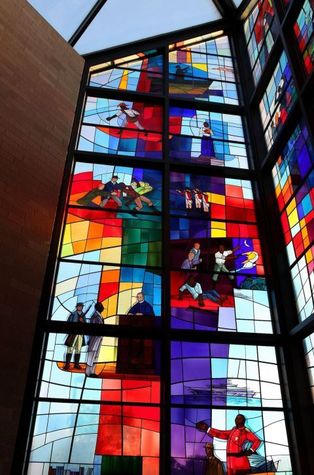 I recently read an article published by the Black Youth Project entitled, “The Black church can engage more Black millennials by bringing politics back into the pulpit” by Maya King, a journalism student at Howard University. After outlining some generational differences, suggesting that social media posts are more powerful than Black church pulpits, and decrying the fact that “not all Black religious institutions are willing to make themselves available on the frontline of social reform,” King concludes by arguing that the first step in restoring the Black Church is acknowledging that it’s “effectively dead.” There is nothing new about this death sentence being pronounced over the Black Church. In fact, King’s article seems to follow the template established by Dr. Eddie Glaude of Princeton’s Department of Religion who articulated this same claim in a provocative op-ed in 2010. His piece started a firestorm of debate and a snowball effect of hundreds of other articles that seemed to take their cues from Glaude declaring as well that the Black Church is dead. Just like Glaude’s piece from 2010, King’s Black Youth Project article cites Pew Research about Black religious life, described the relationship between Black communities and Black Churches as “complicated” and proclaimed that it’s time to “breath new life” into the dead Black Church. It’s a refrain echoed so often that it can make one wonder if it’s being orchestrated or cleverly programmed in our minds in some kind of way. Can it really be just simple coincidence that out of all of the Faith institutions in the country, the message about the Black Church being dead and irrelevant gets amplified with the most passion, ink and air time? It’s almost on the path to becoming a genre of its own with some even going so far as to say “we need to stop building churches and start building institutions.”
Comments
7/11/2017 Comments Worship as Wild CourtshipBy: Matthew Syrdal 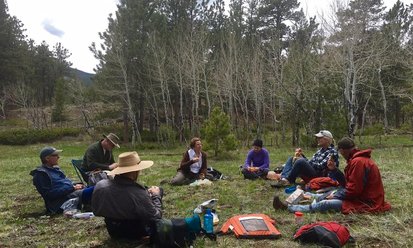 “The heavens are rehearsing the glory of God… Day pours forth speech unto day; night reveals knowledge unto night. They have no speech, they use no words; no sound is heard from them. Yet their voice goes out into all the earth, their words to the ends of the world.” - Psalm 19 I can still smell the pungent perfume of the desert sage congregating below me, rising up from the black depths beneath the canyon rimrock. Their silhouetted arms reach longingly upward toward the heavens. I feel them waiting, silently witnessing the night. The awakened gaze of innumerable stars burns overhead as the face of the moon delicately traces the warm sandstone contours of the canyon rim in a pale light. Alive and in sheer awe, my body stands at the edge of this dark world, vibrating in the stark illuminating gaze of the moon. A sea of darkness yawns open, revealing some other night calling to me in this thin moment. I hear it with my whole being, deep in my cells and bones. A singing. The unending grief of the earth and the longing of the stars calling to each other. Rising together into the night, the fragrance from the bush floor and the song of the cicadas are sown together in a haunting dirge. I listen to these primordial voices as if hearing sound itself for the first time—the sound of innocence in its world-making beauty. Erotic fragrances pour forth in unending praise, harmonizing with the melodic, meditative sounds of these stringed ones. Each note revealing a vaster, older and deeper liturgy—a courtship—that has long preceded human worship. 5/12/2017 Comments A Word for A Day Without Immigrants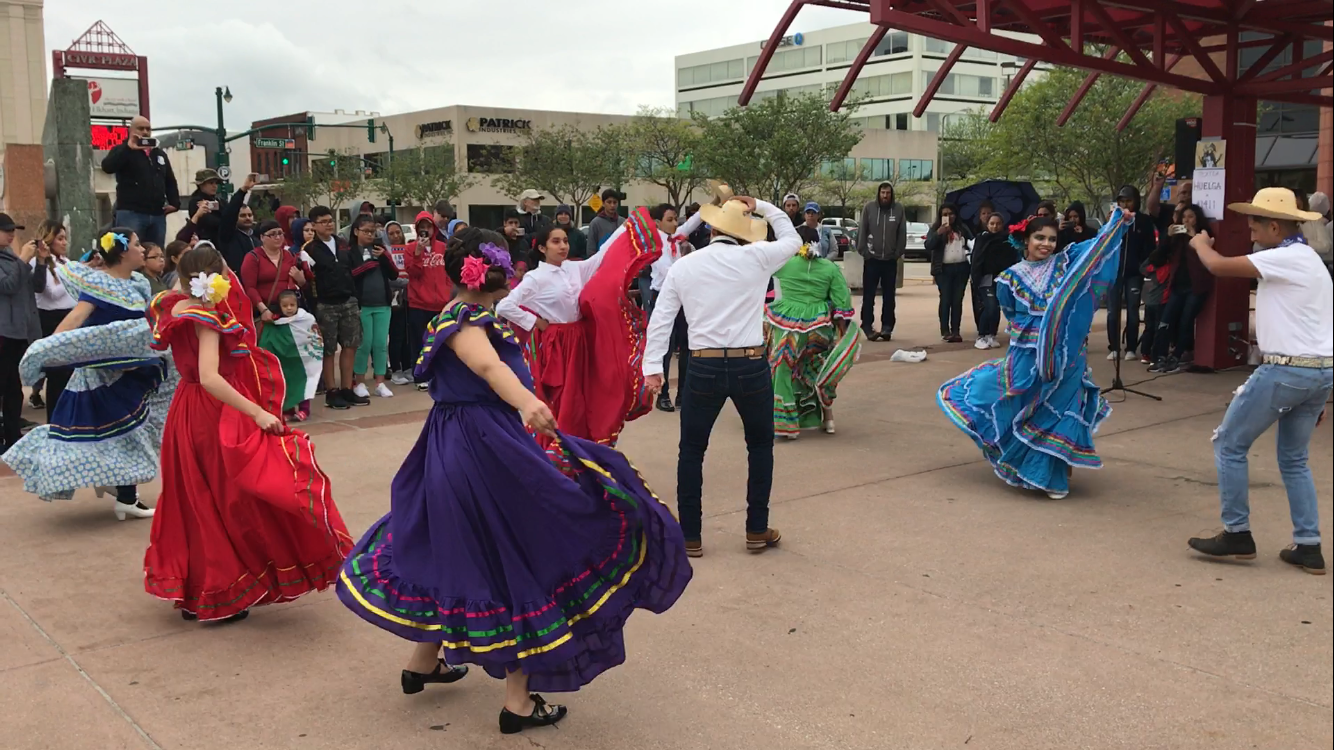 Photo credit Ben Wiebe Photo credit Ben Wiebe By Nekeisha Alayna Alexis Author Nekeisha Alayna Alexis wrote and shared excerpts from a statement for the May 1, 2017 for the A Day Without Immigrants rally in downtown Elkhart, Indiana. This is her final, edited version for publication on Jesus Radicals. There are people who ask of immigrants, “Why do they want special treatment? There are rules. There are laws. Why should they get treated differently?” This can be a frustrating question. But I want to suggest that it is also an opportunity to tell the true story, to tell the true history, to really highlight the unfairness behind the question and the policies, practices and perceptions that surround our immigration system and frame the current debates. I want to suggest, for example, that the question, “Why do they want special treatment?” allows us to talk about the unfairness of U.S. economic policy and military policy that goes into other nations; destabilizes their economies, overthrows their democracies and supports brutal dictator. That help keep those countries in debt through institutions like the World Bank and the International Monetary Fund and otherwise undermine people’s way of lives—only to have the audacity to turn those people away when they show up on U.S. soil. Where do you want us to go after you’ve built military bases on our lands? Where do you want us to go after you’ve helped make it impossible to survive at home? Where do you want us to go—and why shouldn’t we get help when we show up on your door? It’s not special treatment to show us basic human respect when we arrive: that’s reparations for the global problems caused by the economic and military choices this government makes in the world. By: Gregory Williams GregWilliams 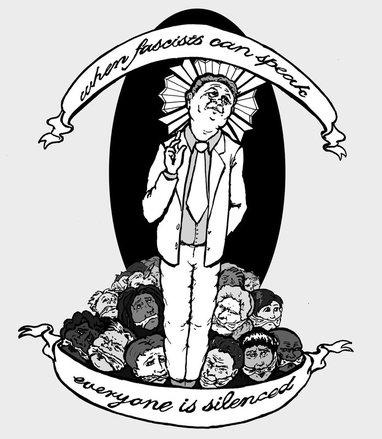 I offer this reflection a bit sheepishly, and with a great many apologies, since it is just over three months late. In December, I agreed to write something on antifascist organizing and direct action in the wake of the election of Donald Trump, and told Brett that I would get him the text in January. At the time, it seemed like a logical thing to do. I had just helped organize two relatively successful mass direct actions against white supremacist groups in central North Carolina, where I live—the first against Alamance County Taking Back Alamance County on Saturday, November 26, 2016 in Burlington, and the second against the Loyal White Knights of the KKK a week later, on Saturday, December 3, 2016 in Pelham, NC and Danville, VA. In both cases I had served as an “above ground” organizer—someone who was unmasked and available to talk to the press and interested members of the public—on behalf of the local branch of my labor union, the Industrial Workers of the World. As such, reflecting on antifascism theologically in a public forum like Jesus Radicals made sense for me, as I was already publicly connected with two actions that could serve as decent case studies. The topic was, of course, urgent—and remains so—for obvious reasons. 4/20/2017 Comments Convincing Christians: On the Work of Animal Liberation in the Name of Jesus—a Reply to Socha and TaylorBy: Nekeisha Alayna Alexis Editor's Note: This article was originally published at Animal Liberation Currents. I said in my heart with regard to human beings that God is testing them to show that they are but animals. For the fate of humans and the fate of animals is the same; as one dies, so dies the other. They all have the same breath, and humans have no advantage over the animals; for all is vanity. All go to one place; all are from the dust, and all turn to dust again. Who knows whether the human spirit goes upward and the spirit of animals goes downward to the earth? 1 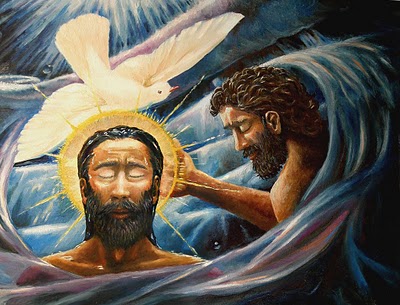 Baptism of Christ: Jesus is baptized in the Jordan River by John. By Dave Zelenka Baptism of Christ: Jesus is baptized in the Jordan River by John. By Dave Zelenka I do not remember how I first came across Ecclesiastes 3:18-21. What I do recall is that I found the passage unexpectedly and I loved it immediately. The poetic text, which trespasses against the human-animal binary, resonated with my perspectives as a vegan, animal liberationist, critical animal scholar, and Christian immersed in Anabaptist theology and ethics and influenced by anarchist politics. Now one of my favorite verses, it is one part of the theological groundwork that informs my spiritual, intellectual and emotional commitment to shalom2 with all God’s creatures. That Ecclesiastes 3:18-21 seemed to pop out of nowhere — that I never heard it preached in a sermon or during Sunday School — testifies to the church’s widespread inattentiveness to other animals and our shallow knowledge of the Bible in general. Even when Christians do notice texts like these, we tend still to distort their meaning. As Rachel Muers notes, Ecclesiastes 21 “has been read as emphasizing the difference between humanity and ‘the beasts that perish.’ In context, however, it makes more sense as a reminder of how questionable the dividing line is between us and the ‘beasts.’”3 An extensive, scholarly examination of Scripture as well as church history, hymnody and other Christian artifacts reveals that mutuality, sameness and interconnectedness between humans and other animals are strong vibrant themes within the faith. Indeed, these themes are more prevalent than our contemporary readings allow us to see, shaped as we are by legacies of the Enlightenment and industrial revolution, by antiquated ideas about human and animal biology, and by anthropocentric philosophies and technologies. Since becoming vegan, a journey that began and crystallized while I attended seminary, I have become increasingly aware of biblical texts and trajectories that decenter humanity and undermine support for dominating other animal persons. These alternative streams interrupt the prevailing narratives of God-ordained exploitation that comprise so much of Christian discourse, practice and belief. Yet they usually go unnoticed, not only by Jesus followers but by our critics as well. 4/16/2017 Comments Resurrection Sunday ConfessionBy: Sarah Lynne Gershon 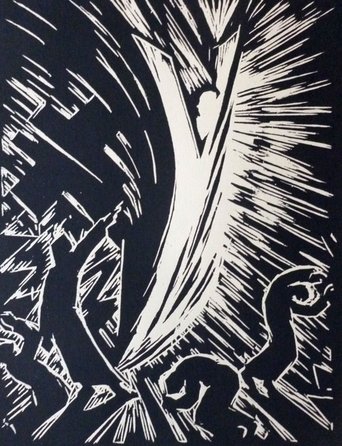 Resurrection Sunday is usually a day of celebration. Churches around the world rejoice in the raising of Jesus Christ, singing songs of death defeating Death and breaking fast with indulgent food, but I have not been swept up in this rejoicing. As I reflect on this day I have felt strongly led into a spirit of confession and repentance. I must confess to you that I don't really believe in the resurrection. I don't believe that life has conquered death, that love overcomes fear, or in the power of the Spirit of God to overcome injustice. Likewise, I suspect that the vast majority of USAmerican Christians, particularly the white majority, don't believe in it either. Our faith is weak, and we regularly betray our professed faith in both our personal and political lives. Easter is a day of celebration, but I cannot participate in a celebratory farce when so many USAmerican Christians cast their ballots for fear: embracing a delusional sense of physical security rather than offering refuge to tormented Syrians, choosing misguided economic security rather than camaraderie with undocumented immigrants, engaging in war, death, and oppression with the pretense of peace and justice. By: Brett Gershon 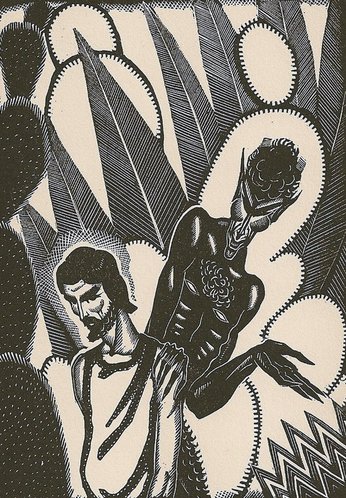 Within the last year, we have witnessed a tremendously significant political upheaval in the United States that has been galvanized by the emergence of a strong white identity-politics. A recent article published in the Huffington Post discusses how while the past several decades have been characterized by a white majority who has operated largely unaware of its whiteness, a strong sense of white identity has been slowly building as people perceive the dominant status of whiteness to be threatened. Those who now occupy seats of power have expertly manipulated the fears of the average white person to believe that their collective interests are at odds not with the upper-crust of capitalist society, but instead with racial and ethnic minorities. Simultaneously, as the white middle-class retreats more deeply into the insularity of white identity-politics, a growing Christian culture that views the Trump presidency as a means to “bring heaven to earth,” is becoming increasingly intertwined with whiteness and its compulsion to fear the racialized other. As people of color continue to fight for their very lives, it is whiteness that impels us to perceive Black struggle to be an affront to our own existence and cling to whatever political foothold we have to preserve ourselves. This is as true of the so called “Alt-Right,” supporters of the Trump presidency, and other conservative leaning White folks as it is of the White liberal who proud of their “open-mindedness” and "commitment to diversity" is quite comfortable in their existence at the center of our social world and when challenged as such will often dive into histrionic fits of White fragility to shield themselves. But what does the Gospel of Jesus Christ have to say to us as we are tempted to strengthen our borders and embolden the social and political lines that have been drawn around us? To answer this question, I pause amidst this Lenten season to reflect upon the central story of Jesus’ temptation in the wilderness and ask what this story has to say to the construct of race as it is being employed in the service of power today. 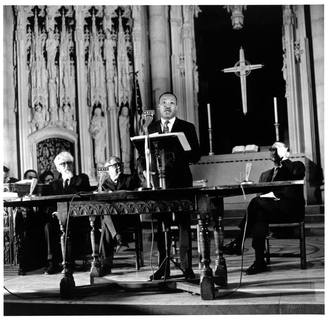 Dr. King delivers the Beyond Vietnam speech on April 4, 1967. Image courtesy of beyondthedream50.org Dr. King delivers the Beyond Vietnam speech on April 4, 1967. Image courtesy of beyondthedream50.org By: Chelsea Page PART ONE "I knew that I could never again raise my voice against the violence of the oppressed in the ghettos without having first spoken clearly to the greatest purveyor of violence in the world today -- my own government. For the sake of those boys, for the sake of this government, for the sake of hundreds of thousands trembling under our violence, I cannot be silent. For those who ask the question, "Aren't you a civil rights leader?" and thereby mean to exclude me from the movement for peace, I have this further answer. In 1957 when a group of us formed the Southern Christian Leadership Conference, we chose as our motto: "To save the soul of America." We were convinced that we could not limit our vision to certain rights for black people, but instead affirmed the conviction that America would never be free or saved from itself unless the descendants of its slaves were loosed completely from the shackles they still wear. In a way we were agreeing with Langston Hughes, that black bard of Harlem, who had written earlier: O, yes, I say it plain, America never was America to me, And yet I swear this oath-- America will be! Now, it should be incandescently clear that no one who has any concern for the integrity and life of America today can ignore the present war. If America's soul becomes totally poisoned, part of the autopsy must read Vietnam. It can never be saved so long as it destroys the deepest hopes of men the world over. So it is that those of us who are yet determined that America will be are led down the path of protest and dissent, working for the health of our land." --An Excerpt from Dr. Martin Luther King's "Beyond Vietnam" speech, delivered at Riverside Church in New York City, April 4, 1967. 3/30/2017 Comments No Pipelines, No PrisonsBy: Dé Bryant Editors note: The following piece was delivered at protest outside of Wells Fargo in South Bend, Indiana calling for divestment from a carceral system that targets black and brown people at a very early age and generates profit off of the destruction of black, brown, and indigenous communities. 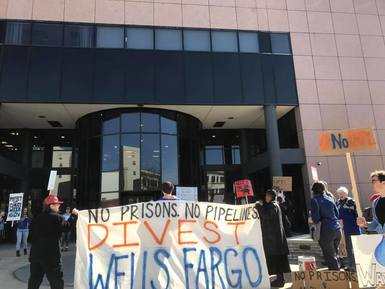 The statistics are startling. The US has 5% of the world's population and 25% of the world's prisoners. Worse, that number has grown from 300,000 prisoners in 1972 to 2.3 million in 2016. That means that one out of every four human beings in the world are locked up here in the land of the free. The US incarcerates at a rate 4 to 7 times higher than other western nations. The US has the highest rate of incarceration in the world. But the things you should be outraged about don't stop with the statistics. You should connect the dots, from history, back, then moving up to this present moment. Go back to 1865 when the 13th Amendment to the Constitution was ratified. Supposedly this formally granted freedom to all Americans. You will find out there were exceptions. That loop hole in the Constitution was a clause that said criminals could still be forced to do labor. By: Joanna Shenk  Note: Sermon preached at First Mennonite Church of San Francisco and originally posted at Radical Discipleship. Isaiah 58:1-12 When my older brother went to college, I remember being taken aback when he said his roommate’s mom was an anarchist. I felt so sorry for his roommate and figured he probably had a terrible childhood. In my mind, being an anarchist meant something related to the anti-christ. It was all one category to me because I thought it was all related to the same word. Fast forward to seminary, after I had learned to spell better and had a bigger vocabulary, and I realized the words weren’t synonymous… I heard about this website called Jesus Radicals that was coordinated by a couple people on campus at Anabaptist Mennonite Biblical Seminary. I learned that the point of the website was to put Christianity and anarchism in conversation with each other. That seemed curious to me and the people who ran the website seemed cool. Through conversation and overtime it just started to make sense to me that people in the Anabaptist tradition would be influenced by anarchism. It was also around this time that I realized feminist was not a scary label either. It just made sense to me that every person regardless of gender should be respected as fully-human and that people following Jesus would want to undo systems of power. |
Disclaimer
The viewpoints expressed in each reader-submitted article are the authors own, and not an “official Jesus Radicals” position. For more on our editorial policies, visit our submissions page. If you want to contact an author or you have questions, suggestions, or concerns, please contact us. CategoriesAll Accountability Advent Anarchism Animal Liberation Anthropocentrism Appropriation Biblical Exegesis Book Reviews Bread Capitalism Catholic Worker Christmas Civilization Community Complicity Confessing Cultural Hegemony Decolonization Direct Action Easter Economics Feminism Heteropatriarchy Immigration Imperialism Intersectionality Jesus Justice Lent Liberation Theology Love Mutual Liberation Nation-state Nonviolence Occupy Othering Pacifisim Peace Pedagogies Of Liberation Police Privilege Property Queer Racism Resistance Resurrection Sexuality Solidarity Speciesism Spiritual Practices Technology Temptation Veganism Violence War What We're Reading On . . . White Supremacy Zionism ContributorsNekeisha Alayna Alexis
Amaryah Armstrong Autumn Brown HH Brownsmith Jarrod Cochran Chelsea Collonge Keith Hebden Ric Hudgens Liza Minno Bloom Jocelyn Perry Eda Ruhiye Uca Joanna Shenk Nichola Torbett Mark VanSteenwyk Gregory Williams Archives
October 2017
|
Search by typing & pressing enter

 RSS Feed
RSS Feed